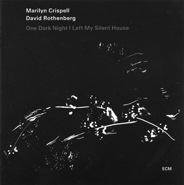Marilyn Crispell/David Rothenberg
One Dark Night I Left My Silent House
(ECM)
When
talking about the music that's released today, the name Marilyn Crispell
stands for "reliability" (which, if one just thinks about it
for a minute or two, it's quite the opposite of "predictability").
The joy I felt upon learning that a new Crispell album, One Dark Night
I Left My Silent House (the title coming from a work by Peter Handke),
was about to be released, could maybe explain the reason why at the time
I mistook clarinet player David Rothenberg, whose name was totally unknown
to me, for reed player Ned Rothenberg. Double surprise: it's David, not
Ned; and the music is quite different from what I (unconsciously) expected.
David
Rothenberg studied with Jimmy Giuffre and Joe Maneri; he's also known as
a philosopher/naturalist; he has written quite a few books on the relationship
between Man and Nature (to name just two, Why Birds Sing and Thousand Mile
Song. I was somewhat surprised to read that some exist as translated into
Italian language), which I'm sure accounts for (at least, in part) the
choice of the titles of the pieces that appear on this album. (Liner notes
are a fantastic invention! But why are there no liner notes, then, in the
CD booklet? And why poor listeners have to read them on the label's website?
Anyway, better to have a fine recorded sound and no liner notes printed
in the booklet than having the liner notes and a bad sound.)
Listening
to this album I got the impression that David Rothenberg is definitely
a mature musician, with clear ideas both on bass clarinet (the instrument
he plays on most of the tracks), which he uses to great effect both in
the reed
"blow" and in the instrument's lower range, and on the more common
clarinet. I was quite surprised to see that on a few pieces Marilyn Crispell
is featured on percussion and on an old piano soundboard, sometimes also
played as a percussion instrument. This album could not really be filed under "jazz",
except as a kind of "mental heritage", the final result being sometimes
a lot closer to a certain (loosely speaking) "folk modality" (a
few tracks reminded me of the way, which sounds parallel to me, Don Cherry
moved in his "folk days"; but it's just a conceptual parallel that
I detect here, the actual results sounding quite different). Having developed
a good measure of mutual understanding in concert, the musicians face the
process of improvising with ears wide open; meanwhile, the fine recorded
sound, and a good mix, help listeners get "inside" the experience.
Opening
track Invocation is light and austere at the same time: a few high notes
on the piano, played "staccato", a "soft-blown" reed
on the bass clarinet, some bass notes with the use of the sustain pedal,
the whole sounding not too far from certain pages by Anthony Davis on his
old album Lady Of The Mirrors. Tsering has some high strings played "pizzicato",
long notes from the bass clarinet, and beautiful melodic fragments. The
Hawk And The Mouse has an agitated bass clarinet placed against the piano
soundboard played with sticks, then a melody that at times sounds like
a jig is backed by a
"percussion orchestra". Stay, Stray reminded me of Monk (it has
a flavour not too distant from, say, Ruby, My Dear), the piano offering
"open" chords to the clarinet's melodic journey.
What
Birds Sing is brief and lively, with high piano, and clarinet. Companion:
Silence features a "hushed" bass clarinet, the piano drawing
a chord
"map", the outcome being a very fine "ballad" of perfect
proportions. Owl Moon has both clarinet and piano playing arpeggios.
Still
Life With Woodpeckers has a lone clarinet and some percussive sounds, as
per its title. Grosbeak is a lively track that really sounds fresh, the
piano in fine dialogue with the clarinet. Dedicated to Joe Maneri, The
Way Of Pure Sound has the clarinet and the piano strings sometimes appearing
in opposite registers, and a somewhat "ethnic"-sounding percussion.
Motmot
has the piano making great use of both hands, and a "lyrical"
clarinet. Snow Suddenly Stopping Without Notice has the clarinet performing
on the outer range, backed by percussion. Evocation is the album's excellent
close: there's a lonely bass clarinet playing slow and melodic for just under
a minute, then the piano appears, almost as inviting the clarinet to remember
on old song.
Beppe Colli
© Beppe Colli 2010
CloudsandClocks.net | June 4, 2010











